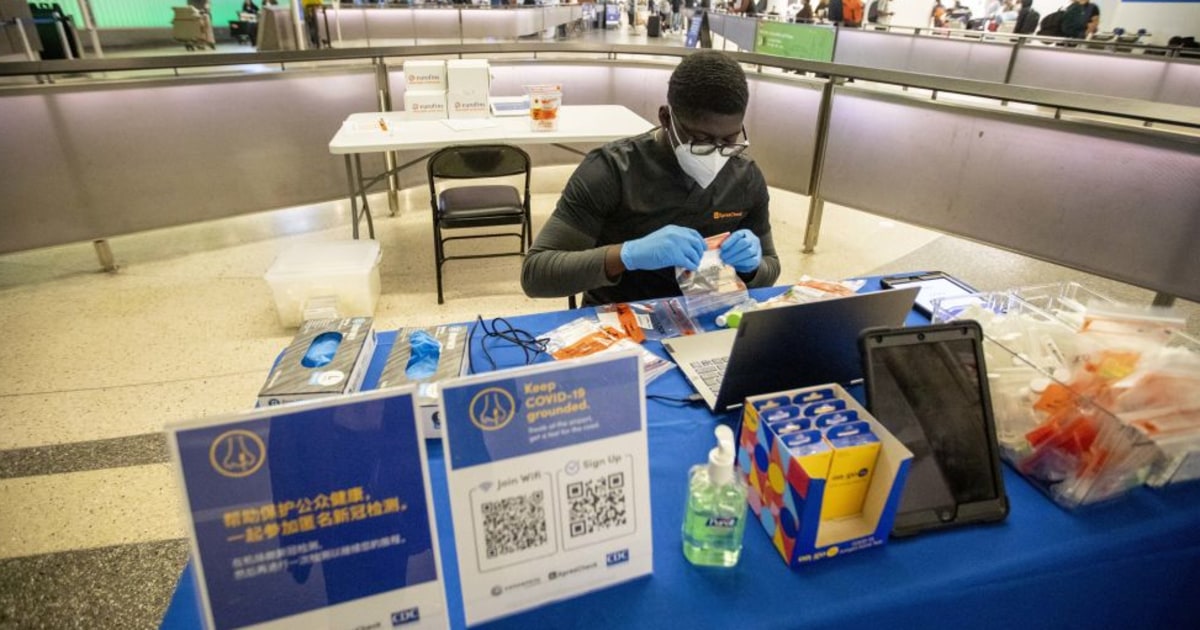By Zeke Miller and Amanda Seitz -
The Associated Press
President Joe Biden told Congress Monday that he will end the two national emergencies to deal with COVID-19 on May 11, as most of the world is living closer to normal nearly three years after they were declared for the first time.
The measure to end public health and national emergency declarations
would formally restructure the federal response to the coronavirus, treating the virus as an endemic public health threat
that can be handled through normal authorities. of the agencies.
It comes at a time when lawmakers have already ended elements of the emergencies that kept millions of Americans covered by health insurance during the pandemic.
Along with cutting off nearly all of the federal funding for COVID-19 relief, it would also remove the administration of vaccines and treatments from the direct management of the federal government.
[U.S. life expectancy drops to 76.4 years and plunges to 1996 levels due to coronavirus and opioid epidemic]
Biden's announcement is included in a statement opposing resolutions to be introduced this week by House Republicans who want an immediate end to the emergency.
House Republicans are also preparing to launch investigations into the federal government's response to COVID-19.
A COVID-19 testing center at Los Angeles International Airport on Monday, Jan. 9, 2023.Bloomberg/Bloomberg via Getty Images
Then-President Donald Trump first declared the COVID-19 pandemic a national emergency on March 13, 2020. Biden has repeatedly extended the emergencies since he took office in January 2021, and they are set to expire in the coming months.
The White House said the president plans to briefly extend both so that they end on May 11.
“An abrupt end to emergency declarations
would create widespread chaos and uncertainty throughout the health care system
: For states, for hospitals and practices, and most of all, for tens of millions of Americans,” the Office of Management wrote. and Budget in a Management Policy Statement.
More than 1.1 million people in the United States have died of COVID-19 since 2020
, according to the Centers for Disease Control and Prevention, a number that includes about 3,700 last week.
[Bivalent booster shots halve the risk of contracting subvariant XBB.1.5]
Congress has already mitigated the scope of the public health emergency that had the most direct impact on Americans, after political calls intensified to end the declaration.
For months lawmakers have refused to comply with the Biden administration's request to allocate billions more dollars to extend the period of free vaccines and diagnostic tests against COVID-19.
And the $1.7 trillion spending package passed last year and signed into law by Biden ended a rule that prohibited states from kicking some recipients out of Medicaid, a move expected to leave millions without coverage after the end of the year. April 1st.
China reports almost 60,000 deaths from COVID-19 in just five weeks
Jan 15, 202300:25
The costs of
COVID-19 vaccines
are expected to skyrocket
once the government stops buying them
, and Pfizer says it will charge up to $130 per dose.
Only 15% of people in the United States have received the updated recommended booster dose that has been offered since last fall.
Those with private insurance may face some out-of-pocket costs for vaccines, especially if they go to an out-of-network provider, Levitt said.
Free in-home trials will also no longer be offered.
And hospitals will not receive additional payments for treating COVID-19 patients.
Lawmakers extended for another two years the
telehealth
flexibilities that were introduced when the pandemic hit, prompting health services across the country to regularly deliver care by smartphone or computer.
The government had already considered ending the emergency declaration last year, but did not do so out of fear of a possible “winter surge” in cases and to give providers, insurers and patients time to prepare for its end.
The officials indicated that the Administration will use the next three months to transition to conventional methods, warning that an immediate end would "sow confusion and chaos in this critical phase."
[Satellite images of crematoriums and funeral homes in China give hints of the real number of deaths from COVID-19]
“To be clear, the continuation of these emergency declarations through May 11 does not impose any restrictions whatsoever on individual conduct with respect to COVID-19,” the Administration said.
“They do not establish mask or vaccine mandates.
They do not restrict school or business operations.
They do not mandate the use of any drugs or tests in response to COVID-19 cases.”
The case count has continued to decline after a slight rebound over the winter holidays, and is significantly below the levels of the past two years, although the number of tests carried out for the virus and reported to health authorities Public has fallen drastically.
On Monday, the World Health Organization declared
the coronavirus to remain a global health emergency
, despite a key advisory group to the body determining that the pandemic may be approaching a "tipping point" at which higher levels of immunity could reduce virus-related deaths.
China, for example, reported an unprecedented increase in December after lifting most of its COVID-19 restrictions.
The CDC asks the population to be vaccinated with the bivalent boosters from Pfizer or Moderna
Jan 26, 202300:47
Shortly before the White House announcement, Rep. Tom Cole, R-Oklahoma, accused the president of needlessly prolonging the public health emergency to take action on issues including the forgiveness of some federal student loan debt.
“The country is largely back to normal,” Cole declared Monday, introducing a Republican-backed bill calling for an end to the health emergency.
“Americans are back to work and school with no restrictions on their activities.
It is time for the government to recognize this reality: the pandemic is over."





/cloudfront-eu-central-1.images.arcpublishing.com/prisa/OOLBKF5K4VFN7EA7IFFA4PMVUE.jpg)


/cloudfront-eu-central-1.images.arcpublishing.com/prisa/PCE7NMB26ZDVRIQX2R26JSNH6A.jpg)
